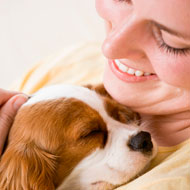Therapists of the future could be canine

Ongoing research aims to explore whether dogs could become a recognised tool for therapists.
Therapists may one day be competing for jobs with dogs, as new research by the University of Lincoln suggests we are more likely to talk to a dog than a human partner. Scientists say the research could have wider implications for therapy sessions.
Findings from a recent survey suggest women are more likely to talk to their dog than their partner when they are feeling jealous.
Canines also find themselves on the end of a rant when their female owners are feeling apathetic. Emotions of anger or fear, however, were more likely to be directed at their partners.
The wider aim of the research, carried out by Lincoln student Aislinn Evans-Wilday, is to explore how dogs could be used to reach out to people during therapy sessions.
Third-year undergraduate student Aislinn explained: “It's my belief that by determining whether or not people are more or less willing to talk to their dog about certain feelings (particularly negative feelings) there is the potential that dogs could become a recognised tool for therapists to encourage patients to gets things off their chest.
“If possible I would like to expand this research even further to assess people's willingness to confide in a dog that isn't their own, such as a therapy dog, versus a figure such as a therapist.”
Currently, Aislinn, who is being mentored by Professor Daniel Mills from the university's School of Life Sciences, plans to expand her research to male participants.
She said: “It is well known that men and women tend to deal with stress in very different ways. Women typically talk more openly about all issues with friends, whereas men tend to talk about positive emotions with partners but keep negative problems bottled up.
“Research indicates that men only really confide in someone when they want a solution to a problem. Men talk in a hierarchy state and are always trying to gain the upper hand. Therefore, it may be they are willing to talk to dogs because they won’t get judged.”
Participants over the age of 18 are invited to take part in the study if they are currently married, in a civil partnership or stable, long-term relationship and own at least one dog. Both the human relationship and dog ownership should have lasted at least six months. Click here to complete the survey.



 The Animal and Plant Health Agency (APHA) has updated its online reporting service for dead wild birds.
The Animal and Plant Health Agency (APHA) has updated its online reporting service for dead wild birds.